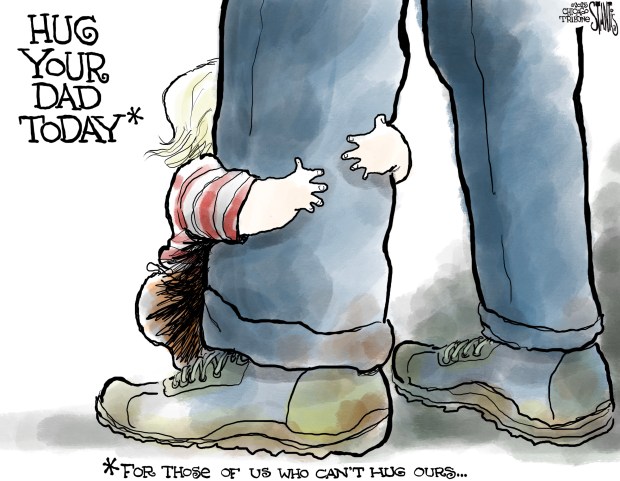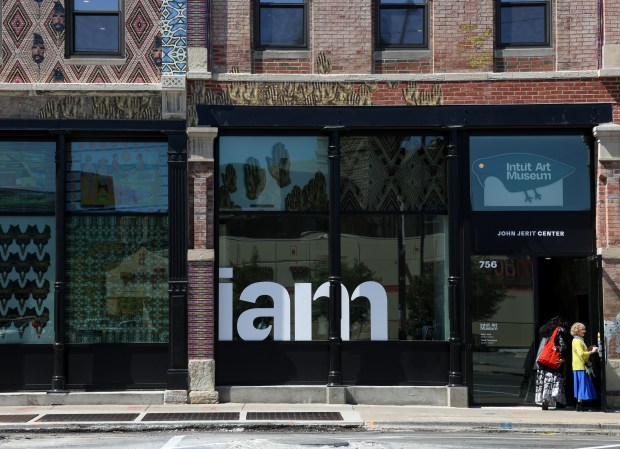How much the death of the illustrious Chicagoan Marian Robinson, the mother of Michelle Obama, had changed her daughter was evident the moment the former first lady opened her mouth Tuesday night at the Democratic National Convention in Chicago.
It was clear that merely returning to her hometown, for the first time (she said) since eulogizing her mother, an event so private to the Obamas it passed without most of Chicago or America noticing, had thrust Michelle Obama back to her loss. This maybe explained why her husband, working on his library, has often come back here alone. But for most of us, this was the first time we had seen her pain.
The loss of a parent changes a person forever. However powerful a person may appear to be.
In her brief but resonant public grieving — “I still feel her loss so profoundly” — Michelle Obama reminded the DNC of mortality, the truth that the rich and powerful suffer the same familial losses as everyone else. You might as well be humble, Michelle Obama was saying, her disdain for partisan politicking once again morphing into her sharpest weapon, because the trappings of power and money offer no protection from life’s biggest jolts.
As we’ve seen her do many times before, Michelle Obama set up a husband who picked up on her theme and, as this formidable double act kicked in again, there we all were back in 2008, believing the Obamas’ prescription of a post-racial America as a unified, hopeful place where people believe in an American Dream open to all, are respectful of their elders’ sacrifices, and attend first and foremost to the common need.
The Obamas were drawing a sharp contrast with Donald Trump, of course. That was not a hard task, given that he traffics in anger and personal grievance.
But as the centrist Obama worldview has given way to socialist Democratic thinking, there was a message here for Democrats and the dangers of the party’s using the kind of language that alienates working-class whites, especially men, especially rural voters of all races, and its bitter attacks on the half of America that is not on the same page of the delegates showing joy for the cameras in Chicago. The Obamas are Democratic elites themselves, but they still grasp where the party fails to see its own destructive tendencies. On Tuesday they called time on the entire Republicans-are-anti-democratic-fascists line of thinking.
“No one,” Barack Obama said, “has a monopoly on what it means to be an American.” That’s not what people hear from the so-called “squad” or some other Democratic moralists. He spoke of a “common creed,” not defined by race — an idea at odds with what many Americans now are told in workshops, even though America’s diversity should be its biggest asset. And he pointed out that just as the Democratic faithful wants things for themselves from their leaders, so does the rest of the country. And fair enough.
Obama even told the delegates, who’d been demonizing the opposition all week, that they might learn something from Republicans if they only took a moment to speak with them, a piece of relative thinking that reflects a skill many younger Democrats have failed to learn.
And he pointed out a truth so obvious that neither party appreciates it: Most Americans despise living in a bitterly divided nation and can see with their own eyes that it has a detrimental effect on their country and the world at large.
The winner in November, he suggested, will be the one who can define the alternative that’s lingering, dormant, in the collective American subconscious.
Obama’s unspoken subtext was that the former nominee and his former vice president, Joe Biden, was either not, or was no longer, capable of doing anything like that. Anyone who heard Biden’s Monday night speech knew that what Obama was saying was true. Obama came down from the mountaintop to twist the necessary knife, perhaps, but he went right back up the hill.
So now where will Vice President Kamala Harris take us on Thursday night?
For the last several days, she has been defined at the United Center by one sycophant after another. Sincere boosters for the most part, it seemed to us, but boosters just the same. Her husband, Doug Emhoff, did his part Tuesday night with a genial, if selective, account of his personal biography. He seems like a decent guy, but America is not electing a first gentleman or the best laugher. It’s electing a president of the United States. And the candidate is a current veep who has seemed to do and say very little of substantial worth — far less than typically is the case even in that famously limiting office.
Given how Harris’ nomination came about, the public knows less about her than any other major-party presidential nominee in memory. That’s not her fault, but it is her task to address; this is the highest-stakes acceptance speech we can remember because of the blank-canvas nature of her candidacy so far.
She also must tell us what she stands for outside of platitudes. Her most important assignment is to say how her administration will differ from its predecessor, of which she was a part.
Is this more of the same? And, if not, how not? Does she promise moderation or radicalism? Is she a believer in free enterprise or an “anti-capitalist”? Does she support Israel’s right to exist, if not every action of the Netanyahu administration? She cannot ignore immigration, given her past assignment, border czar or not. And what is her position on American exceptionalism and how the nation will lead abroad? We don’t yet know enough.
Harris ought to tell us where she will make the tough choices and not, as has been her wont, traffic in platitudes or merely tell each side what they want to hear. She should make clear when and where she plans to interfere with the markets and the wealth generated by the private sector or if she will strive to leave it alone. Is the era of big government coming back with her? Or not?
Does she plan to follow the Obama playbook?
That’s a trick question.
She could try but, in the end, she could not, even if she wanted to do so. As Barack Obama said Tuesday, the rise of social media profoundly has shifted America, even as 44’s hair has turned gray. We now have, he rightly noted, “a culture that puts a premium on things that don’t last.”
That was not of Republican or Democratic doing, whatever you might have been hearing this week. It is the price we’re all paying for unimpeded technological innovation without clear vision of the future. Brutally efficient algorithms have built much of the great divide, and artificial intelligence now threatens jobs, the mental health of kids and, worst of all, Obama’s “common creed.”
Consider the level of change since that unforgettable night in Grant Park in 2008. As pretentious as it may sound, Harris’ main task Thursday is to explain how she would now define American identity.
If not the president, then who else?
Submit a letter, of no more than 400 words, to the editor here or email letters@chicagotribune.com.




